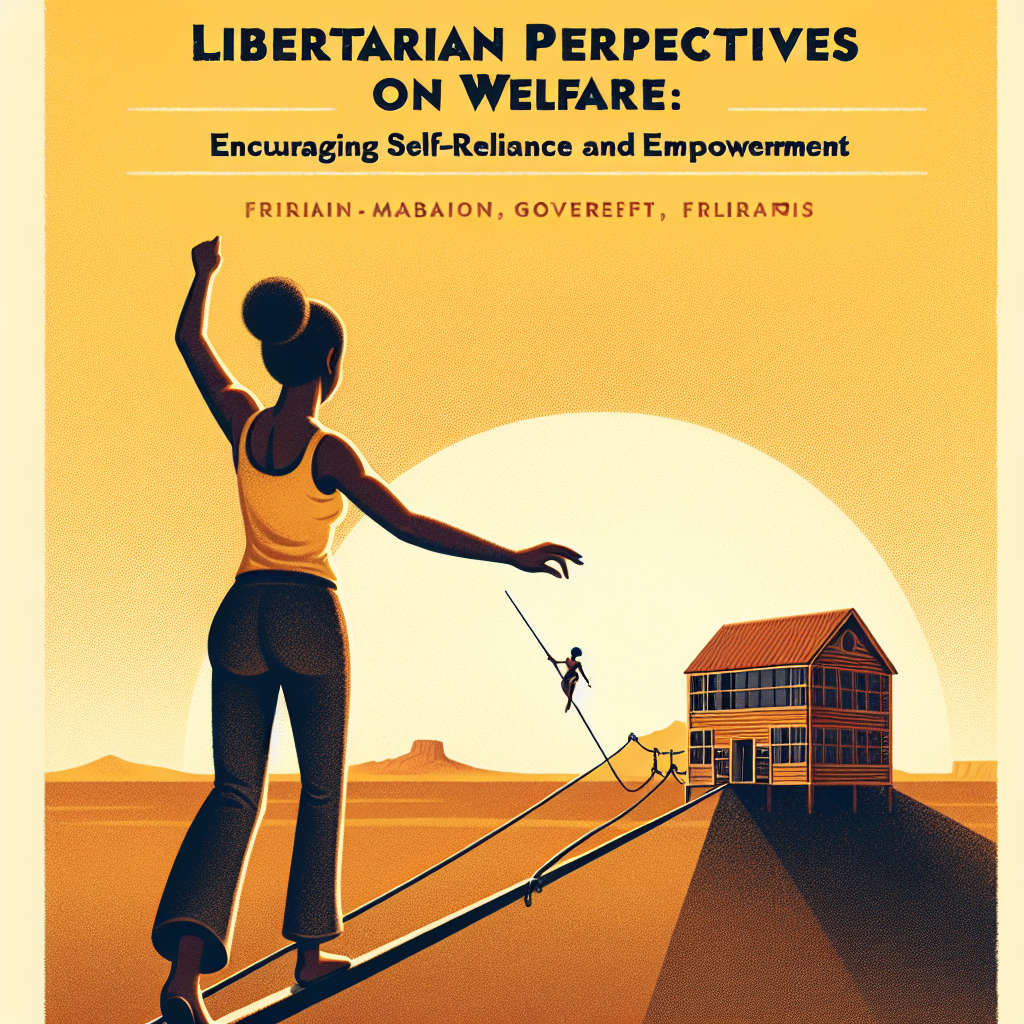Libertarian Perspectives on Welfare: Encouraging Self-Reliance and Empowerment
In recent years, welfare has become a contentious topic in political discourse, often dividing opinions across the political spectrum. Libertarians offer a unique perspective on welfare, advocating for policies that promote self-reliance and empowerment rather than dependence. This article delves into the libertarian viewpoint on welfare, exploring the philosophy behind their stance, potential alternatives, and ways to create a more empowered society.
Understanding Libertarianism and Welfare
Libertarianism is a political philosophy that places a strong emphasis on individual liberty, personal responsibility, and minimal government intervention. In this context, welfare programs, which are often funded and managed by government entities, are seen as ineffective in fostering true independence among citizens. Many libertarians argue that such systems can create dependency, stifling personal initiative and self-sufficiency.
The Problem with Government Welfare Programs
At the heart of libertarian criticism of welfare is the belief that government-run programs tend to be inefficient and bureaucratic. These systems can foster reliance on assistance rather than promoting individual empowerment. Libertarians argue that welfare programs often fail to address the root causes of poverty and instead provide temporary relief that does not lead to long-term improvements in people’s lives.
Promoting Self-Reliance and Empowerment
Libertarians advocate for policies that emphasize personal responsibility and self-reliance as solutions to economic hardships. This approach prioritizes empowering individuals to take charge of their own lives rather than relying on government support. Here are some libertarian strategies aimed at enhancing self-sufficiency:
1. Reducing Government Intervention
One of the primary libertarian recommendations for reforming welfare is to reduce government intervention in markets and individuals’ lives. By removing excessive regulations and barriers to entrepreneurship, libertarians believe that individuals will have greater opportunities to create jobs and steer themselves out of poverty. This could potentially lead to increased economic growth and improved living conditions for all.
2. Encouraging Charitable Alternatives
Instead of government-funded welfare programs, libertarians advocate for charitable organizations and private voluntary systems as viable alternatives. By encouraging community involvement and philanthropy, resources can be directed to those in need without creating a cycle of dependency. Charitable organizations often have a more nuanced understanding of the needs of their communities and can tailor their assistance accordingly.
3. Empowering Education and Skills Development
Another libertarian approach to welfare reform focuses on education and job training. By investing in educational resources, vocational training programs, and mentorship initiatives, individuals can acquire the skills needed to secure stable employment. An educated and skilled workforce is better equipped to achieve economic independence and contribute positively to society.
The Role of Local Communities
Libertarians emphasize the importance of local communities taking charge of welfare-related initiatives. Community-based programs can often allocate resources more effectively and respond to the unique challenges faced by their residents. Empowering local organizations to address welfare needs fosters a sense of ownership and accountability among community members, promoting self-reliance.
The Importance of Personal Responsibility
At the core of the libertarian perspective on welfare is the emphasis on personal responsibility. Encouraging individuals to take ownership of their situations not only fosters self-sufficiency but also instills a sense of dignity and accomplishment. By promoting the narrative that individuals are capable of achieving their own success, the libertarian approach seeks to inspire a culture of resilience.
Conclusion: A Shift Towards Empowerment
While the welfare debate will likely continue to evolve, the libertarian perspective offers valuable insights into the importance of self-reliance and empowerment. By advocating for reduced government intervention, community involvement, and personal responsibility, libertarians challenge the status quo and encourage a more effective approach to addressing poverty and social welfare.
In exploring these perspectives, it becomes clear that fostering individual initiative and encouraging empowerment can lead to a society where people are not merely surviving on assistance but thriving on their own merits. A shift towards these principles may pave the way for a more prosperous future, not just for individuals but for society as a whole.
This article dives deep into libertarian perspectives on welfare, providing a thorough understanding of their ideology and how it promotes self-reliance and empowerment. With a focus on improving SEO through keywords and structured subheadings, readers can easily explore different facets of this topic.
Share this content:












Post Comment